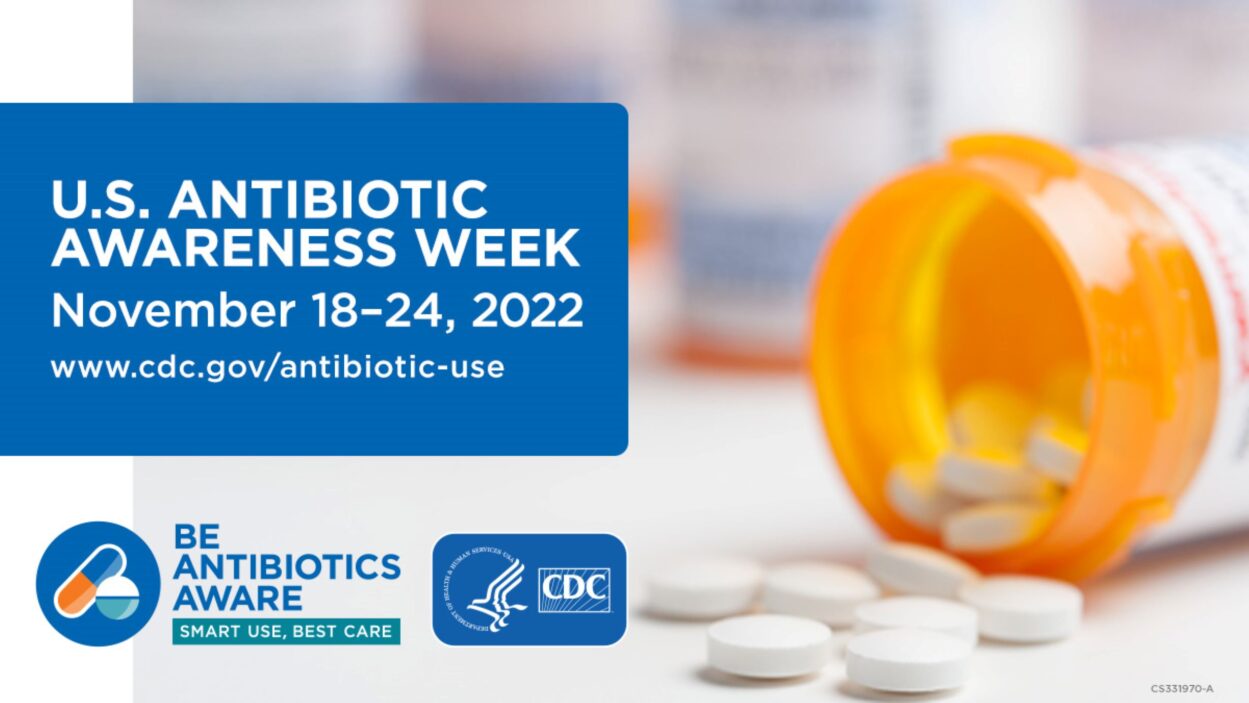Joint Commission and CMS Conditions of Participation Updates for Antimicrobial Stewardship Programs in Hospitals and Critical Access Hospitals

Joint Commission and CMS Conditions of Participation Updates for Antimicrobial Stewardship Programs in Hospitals and Critical Access Hospitals
Antibiotic Awareness Week 2022
On July 6th, 2022, the Centers for Medicaid and Medicare Services (CMS) released updates to interpretive guidance for their current Conditions of Participation (CoP) for hospital regulatory requirements related to infection prevention and control and antibiotic stewardship programs (ASP), effective immediately. There was no change to the CoP themselves, but CMS clarified what exactly surveyors should be looking for when assessing sites. In addition, The Joint Commission (TJC) released prepublication standards for new and revised requirements addressing antibiotic stewardship for the hospital and critical access hospital programs. These standards were released in July of this year with an effective date of January 1st, 2023. These updates only pertain to hospitals and critical access hospitals, they do not pertain to nursing care centers.
Knowing and implementing TJC and CMS requirements for ASPs is essential for a successful program. Furthermore, TJC recommendations are something to take note of for all facilities, as other accrediting bodies often follow TJC in their requirements. To increase awareness and understanding of these updates, they have been summarized below.
The following four TJC Elements of Participation (EPs) were revised mainly to align with the new CMS CoP interpretive guidance.
#1: TJC EP 11 – aligns with CMS CoP 482.42(b)(1) – Identify a Leader
The governing body appoints a physician and/or pharmacist who is qualified through education, training, or experience in infectious diseases and/or antibiotic stewardship as the leader(s) for the ASP.
- Establishes accountability for the program’s activities and outcomes
- The appointment(s) is based on recommendations of medical staff and pharmacy leadership
- Training and/or certification may include specialty boards in adult or pediatric populations
- American Board of Internal Medicine, American Board of Pediatrics (physicians)
- Society of Infectious Diseases Pharmacists, Board of Pharmacy Specialties (pharmacists)
- Infectious Diseases Society of America and the Society for Healthcare Epidemiology of America also offer ASP courses for physicians
- Local or regional ASP conferences, such as the Nebraska Antimicrobial Stewardship Summit
- Maintain qualifications through ongoing education and training
#2: TJC EP 12 – aligns with CMS CoP 482.42(c)(3) – Leader Responsibilities
The leader(s) of the ASP is responsible for the following:
-Developing and implementing a hospital wide antibiotic stewardship program
-Documenting antibiotic stewardship activities, including any new or sustained improvements
-Communicating and collaborating with the medical staff, nursing leadership, and pharmacy leadership, as well as with the hospital’s infection prevention and control and quality assessment and performance improvement programs on antibiotic use issues.
-Providing competency-based training and education of staff, including medical staff, on the practical applications of antibiotic stewardship guidelines, policies, and procedures.
#3: TJC EP 14 – aligns with CMS CoP 482.42(b)(2)(i) – Internal Coordination
The ASP demonstrates coordination among all components of the hospital responsible for antibiotic use and resistance, including, but not limited to, the infection prevention and control program, the quality assessment and performance program, the medical staff, nursing services, and pharmacy services.
- For smaller hospitals and critical access hospitals, combining the antibiotic stewardship committee meeting with IP/IC and QAPI satisfies this. If meetings are combined, there should be a dedicated agenda for ASP items during the meeting to show dedication to stewardship.
#4: TJC EP 15 – aligns with CMS CoP 482.42(b)(2)
The ASP documents the evidence-based use of antibiotics in all departments and services of the hospital
- This does not mean documenting appropriateness of every antibiotic ordered
- What this does mean is that antibiotic use is consistent with documented ASP recommendations
- Create ordersets based on ASP recommendations to guide therapy choices
- Create guidance documents based on ASP recommendations that are easily accessible
- Educate outliers when needed
The following TJC EPs are either new or revised.
#5: TJC EP 10 – Allocates Resources – Revised
The hospital allocates financial resources for staffing and information technology to support the ASP
- Ensures that staff have the time and expertise to implement successful activities
- Requirements do not specify the number of staff or hours devoted to the program. This could be determined by the organization size and patient population
- Acknowledges and prioritizes the need for IT support
#6: TJC EP 13 – Multidisciplinary Committee – Revised
The hospital has a multidisciplinary committee that oversees the ASP
- May include medical staff, pharmacy services, the infection prevention and control program, nursing services, microbiology, IT, and the quality assessment and performance improvement program
- May include part-time or consultant staff which can be on site or remote
#7: TJC EP 16 – Monitor Antibiotic Use – New
The ASP monitors the hospital’s antibiotic use by analyzing data on days of therapy per 1000 days present or 1000 patient days, or by reporting antibiotic use data to the National Healthcare Safety Network’s (NHSN) Antimicrobial Use Option of the Antimicrobial Use and Resistance Module.
- Helps determine if ASP activities are decreasing inappropriate antibiotic prescribing
- Can identify areas for improvement
- Hospitals are encouraged to electronically submit antibiotic use data, though this can be difficult for smaller hospitals.
- Setting up an excel file that can do calculations automatically can be helpful if your institution is unable to electronically submit data to NHSN.
- Nebraska ASAP has a freely available excel file on its website that can be used for this purpose.
#8: TJC EP 17 – Strategies to Optimize Prescribing – New
The ASP implements one or both of the following strategies to optimize antibiotic prescribing:
-Preauthorization for specific antibiotics that includes an internal review and approval process prior to use
-Prospective review and feedback regarding antibiotic prescribing practices, including the treatment of positive blood cultures, by a member of the antibiotic stewardship program
- Provides flexibility for ASPs depending on program expertise and organization complexity
#9: TJC EP 18 – Implement Guidelines – Revised
The ASP implements at least two evidence-based guidelines to improve antibiotic use for the most common indications.
-Examples include but aren’t limited to: Community acquired pneumonia, urinary tract infections, skin and soft tissue infections, use of surgical prophylactic antibiotics, asymptomatic bacteriuria, clostridioides difficile colitis, plan for parenteral to oral antibiotic conversion
-Evidence based guidelines must be based on national guidelines and also reflect local susceptibilities, formulary options, and patients served, as needed.
- Provide recommendations for antibiotic selection and duration
#10: TJC EP 19 – Evaluate Adherence – New
The ASP evaluates adherence (including antibiotic selection and duration of therapy, where applicable) to at least one of the evidence-based guidelines the hospital implements.
- Helps determine the impact of the intervention
- Can measure adherence at the group level (departmental, unit, clinician subgroup)
- Obtain adherence data for a sample of patients from relevant clinical areas by analyzing electronic health records or by conducting chart reviews
#11: TJC EP 20 – Collect, Analyze, and Report Data – Revised
The ASP collects, analyzes, and reports data to hospital leadership and prescribers
- Provide regular updates about successful interventions, areas that need improvement, and need for more resources
- This data can include antimicrobial resistance patterns, prescribing practices, or an evaluation of antibiotic stewardship activities
#12: TJC EP 21 – Act on Improvement Opportunities – Revised
The hospital takes action on improvement opportunities identified by the ASP
- Hospital provides resources to support strategies and interventions
- Develop an action plan to improve antibiotic use
For the full updates, see the below links:
CMS: https://www.cms.gov/files/document/qso-22-20-hospitals.pdf
Nebraska ASAP offers free, non-regulatory antibiotic stewardship program assessments for both hospitals and nursing care centers. These assessments are based off the CDC Core Elements of antimicrobial stewardship which correlate to the above requirements from CMS and TJC. The goal of these assessments is to help improve ASP programs and help them follow CMS and TJC requirements. If your program is interested, fill out the corresponding self-assessment here and someone from the ASAP program will be in touch to set up a meeting.
 Written by Danny Schroeder, Pharm.D., BCPS
Written by Danny Schroeder, Pharm.D., BCPS
Antimicrobial Stewardship Pharmacist, Nebraska ASAP



